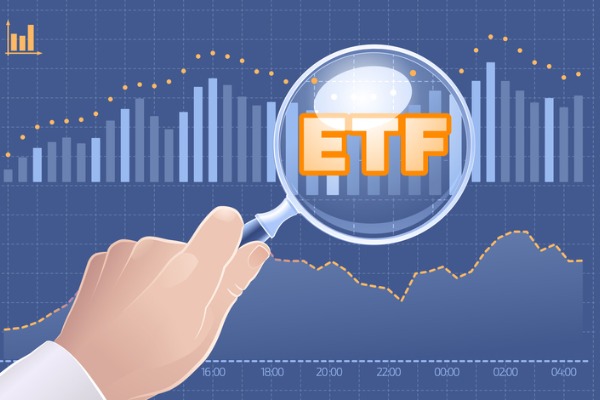Here’s a selection of weird and wonderful ETFs
We take a look at some of the more interesting ETFs found on interactive investor.
28th May 2021 14:10
by Tom Bailey from interactive investor
We take a look at some of the more interesting ETFs found on interactive investor.

There now seems like there’s an exchange-traded fund (ETF) for everything. Think of any investing theme, stock characteristic, region or alternative asset class and there is a good chance there is an ETF offering exposure.
This has, of course, been most pronounced in the US, where the market for ETFs is much more developed. For example, recently Tuttle Capital Management launched the FOMO ETF. FOMO is a popular finance acronym and stands for “fear of missing out”.
As the name suggests, this ETF aims to give exposure to the most popular assets. While the focus is on stocks, it can also hold special purpose acquisition companies (SPACs), other ETFs and cryptocurrencies. The ETF’s holdings are actively managed, meaning that it does not track a pre-defined index.
- Seven ‘buy and forget’ shares for investors with time on their side
- Check out our award-winning stocks and shares ISA
Another recent quirky ETF launch was the VanEck Vectors Social Sentiment ETF, which uses the ticker BUZZ. This ETF tracks the BUZZ NextGen AI US Sentiment Leaders Index, which is an index that weights stocks according to their online ‘hype’. As a result, it has been dubbed a ‘meme stock’ ETF.
Unfortunately, these ETFs are not available to UK investors – for now at least. For an ETF to be available to UK-based investors, there are several regulatory hurdles.
However, that’s not to say there are not a selection of weird and wonderful ETFs providing exposure to niche themes or asset classes. Below, we take a look at some of the more interesting ones that are available on interactive investor.
Blockchain ETFs
One of the most popular finance news stories this year has been cryptocurrency. It is therefore perhaps apt to start with the ETFs that provide access to this theme.
One of the most popular is the Invesco Elwood Global Blockchain ETF (LSE:BCHN). This ETF tracks the Elwood Blockchain Global Equity Index. This index offers a mix of exposure to both companies involved directly in bitcoin and cryptocurrency mining and trading (so-called pure plays) alongside more conventional companies deemed to be making use of ‘blockchain technology’, the underlying tech behind bitcoin and other cryptocurrencies.
- Cryptocurrency crash takes its toll on popular blockchain ETF
- Blockchain ETFs: a way to gain bitcoin exposure?
Year-to-date it has returned 26.7%. It has an ongoing charge of 0.65%.
There is also another blockchain ETF, the First Trust IndxxInnvtvTrsctn&PrcssETF (LSE:BLOK). This ETF is much less racy than the Invesco one due to not having any cryptocurrency pure plays. Instead, it tracks an index of companies that have made a “material investment” in blockchain technology.
Year-to-date it has returned 8.9%, with an ongoing charge of 0.65%.

Video games ETFs
Video games are big business. According to figures from Statista, in 2020 worldwide PC gaming revenues totalled almost $37 billion (£26 billion). Meanwhile, the mobile gaming market generated an estimated revenue of more than $77 billion.
For anyone looking to get in on this growing and increasingly profitable industry, there are two ETF options: the VanEck Vector™ Video Gaming & eSports ETF (LSE:ESPO) and the Global X Video Games & Esports ETF (LSE:HERU).
The VanEck ETF tracks the MVIS Global Video Gaming eSports Index, composed of 25 stocks, for 0.55%. Year-to-date it has returned -3.2%.
The Global X ETF tracks the Solactive Video Games & Esports V2 Index, composed of 40 stocks, costing 0.5%. Year-to-date it has returned -0.2%
We took a deeper dive into the difference between the two here.
Castles protected by a MOAT ETF
Anyone who has read about stock-picking will have come across the idea of companies with a “moat”, popularised by Warren Buffett.
This refers to a business with a long-term sustainable competitive advantage, which protects its market share and profits from rivals.
As Buffett himself has described it: “What we’re trying to do is we’re trying to find a business with a wide and long-lasting moat around it, protecting a terrific economic castle with an honest lord in charge of the castle.”
Rather than trying to work out which companies actually have a moat, however, there are two ETFs that track an index of companies deemed to.
First, there is the VanEck Vectors Morningstar Global Wide Moat ETF (LSE:GOAT). This tracks the previously mentioned Morningstar Global Wide Moat Focus Index, for an ongoing charge of 0.52%. Year-to-date it has returned 8.29%
Another option is the VanEck Vectors Morningstar US Wide Moat ETF (LSE:MOAT). This index is composed of US companies with strong moats and attractive valuations. It is slightly cheaper than the global version, charging 0.49%. Year-to-date it has returned 13.7%.
Cannabis ETFs
Across the world, governments are reducing restrictions on the use and sale of cannabis for either medical or leisure use. This has been most pronounced in the US, but other countries such as Canada are also liberalising laws around the drug.
As a result, there is now a burgeoning legal cannabis industry, which has given birth to several cannabis ETFs.
For UK investors, there are two main options. Rize Medical Cannabis & Life Sci ETF (LSE:FLWR), which charges 0.65% to track the Foxberry Medical Cannabis & Life Sciences USD Net Total Return Index. Year-to-date it has returned 24.3%.
The other option is the Medical Cannabis and Wellness ETF (LSE:CBDX). This ETF tracks the Solactive Medical Cannabis and Wellness Equity Index, with an ongoing charge of 0.8%. Year-to-date it has returned 18.7%.
- Cannabis ETFs have winning month thanks to US election
- Why an equal weight ETF isn’t just a short-term play
- The ETFs Show: Roger Federer, Warren Buffett and passive investing
Cannabis use and possession remains illegal in the UK. However, it is not illegal to invest in companies that are involved in the medical use and sale of cannabis, provided it is in line with local laws.
The ETFs mentioned above have been approved by the Financial Conduct Authority and been allowed to list on the London Stock Exchange (LSE), alongside other legal cannabis-related investments.

Hydrogen ETF
Renewable energy has been one of the most popular ETF themes over the past year – perhaps too popular.
For those wishing to position towards the transition away from oil and coal, however, there is another option: the L&G Hydrogen Economy ETF USD (LSE:HTWO).
This is a thematic ETF that intends to offer exposure to companies that are enabling the production of cheaper and clean forms of hydrogen, as well as those that are expected to play an integral role in the hydrogen economy. Hydrogen energy is a so-called clean fuel. Unlike oil and coal, when consumed it does not emit CO2. As a result, it is a seen as an environmentally friendly fuel source.
- ITM Power: the hydrogen stock’s CEO under the spotlight
- ITM Power: a star of the green investor revolution
It has an ongoing charge of 0.49% and lost over 20% since its launch in February.
Lumber and wood ETFs
The price of lumber in the US has soared in recent months. On the demand side, this is due to a surge in demand for houses and renovations. On the supply this, there are bottlenecks in the process of turning raw wood to useable lumber.
One way for investors to play this has been the iShares Global Timber&Forestry ETF (LSE:WOOD). For 0.65%, this ETF tracks the S&P Global Timber & Forestry Index, which is comprised of the 25 largest publicly traded companies engaged in the “ownership, management or the upstream supply chain of forests and timberlands”. Year to date it has returned 9.9%.
Online shopping ETFs
You’ve heard it before, but we are in the process of a shift from bricks-and-mortar retail to online shopping. High streets, even before the pandemic, were full of boarded-up shops, while companies such as Amazon (NASDAQ:AMZN) and Alibaba (NYSE:BABA) are among the biggest and most successful in the world.
To gain access to this theme, ETF investors have two choices.
First, there is the Global Online Retail ETF (LSE: IBUY). For those fearing that this will just be an ETF dominated by Amazon, fear not. Each company in the index is assigned an initial weight according to its year-over-year quarterly revenue growth percentage. This means that companies with better revenue growth receive a greater weighting.
As a result, the world’s largest e-commerce companies, such as Amazon, do not automatically have a huge weighting. Instead, the top holdings are often lesser-known companies. For example, one of its biggest holdings currently is Poshmark (NASDAQ:POSH), a second-hand market place.
- Is this the best ETF to profit from the rise of e-commerce theme?
- Take control of your retirement planning with our award-winning, low-cost Self-Invested Personal Pension (SIPP)
The ETF has an ongoing charge of 0.69%. It has lost 5.6% since its launch in April.
However, the e-commerce revolution isn’t only taking place in rich economies. Emerging markets are also very much part of this transition, most notably China.
For those wishing to get exposure to the emerging market side of e-commerce there is the EMQQ Emerging Mkts Internet & Ecommerce (LSE:EMQQ). This provides exposure to leading internet and e-commerce companies serving emerging markets.
This ETF is a play on both the tech transformation of emerging markets and the expected growth of middle-class consumption in these countries. It has a charge of 0.8%. Year-to-date it has returned -6.9%.
All returns are total return, denominated in GBP sterling, dated to 26 May 2021.
These articles are provided for information purposes only. Occasionally, an opinion about whether to buy or sell a specific investment may be provided by third parties. The content is not intended to be a personal recommendation to buy or sell any financial instrument or product, or to adopt any investment strategy as it is not provided based on an assessment of your investing knowledge and experience, your financial situation or your investment objectives. The value of your investments, and the income derived from them, may go down as well as up. You may not get back all the money that you invest. The investments referred to in this article may not be suitable for all investors, and if in doubt, an investor should seek advice from a qualified investment adviser.
Full performance can be found on the company or index summary page on the interactive investor website. Simply click on the company's or index name highlighted in the article.